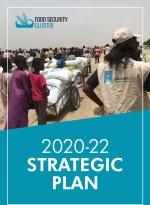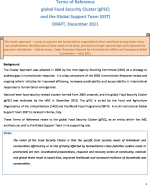About Food Security Cluster
Working in Partnership
The Food Security Cluster (FSC) is about enhancing cooperation and partnerships. The FSC works directly with its partners and stakeholders that include NGOs, the Red Cross and Red Crescent Movement, UN organizations, Governments and Donors. The FSC was formally endorsed by the Inter Agency Standing Committee (IASC) on the 15 December 2010.
Global Coordination for Enhanced Food Security
FSC has been established in 2011 to coordinate the food security response during a humanitarian crisis, addressing issues of food availability, access and utilisation.The Cluster is based at WFP headquarters in Rome and is co-led by FAO and WFP. The Global Support Team includes FAO, WFP and INGO staff.
Operating in Emergencies and protracted crises
FSC is committed to saving lives through the coordination of the food security response in major emergencies. Effective coordination is only possible through close cooperation with partner organizations. The FSC provides the guidance at the country level that supports a broad base and timely response.The FSC works with national cluster systems in both sudden onset disasters, be they from natural or human causes, and protracted crises
Priority Result Areas of the Food Security Cluster 2020-2022
For the period 2020 -2022, the global Food Security Cluster is planning to achieve four strategic results through a set of focus areas of interventions and activities that are described below. Cross-cutting dimensions (Partnerships and capacity building; Safe programming and gender-based violence (GBV); Environment and climate change footprint (green response) are mainstreamed throughout the strategy and the work plan.
RESULT 1: Improve food security information for decision making
One of the key responsibilities of the FSC is to ensure that all partners are able to make informed decisions based on reliable and timely evidence (assessments, studies, Integrated Food Security Phase Classification (IPC), Cadre Harmonisé (CH), etc.). In this regard, the FSC contributes to enhancing and facilitating partners’ capacity to collect and analyse data in a coordinated process. The FSC serves as a platform and mechanism to support joint analysis initiatives and data collection efforts, encouraging partners to be active players throughout the assessment cycle. The FSC actively ensures that a repository of relevant and reliable information is in place by collating and mapping out information from various sources (governments, agencies, civil society organizations, research institutes, disaster committees, etc.), which is later disseminated to partners.
To ensure that the planning and coordination of food security responses is timely, needs- and evidence-based, the FSC will focus on the following areas of work:
Focus Area 1:
Make use of Early Warning Systems and assessments in order to ensure early action and rapid response
Focus Area 2:
Support the implementation of IPC, CH or other situational analysis tools/processes in-country
Focus Area 3
Contribute to multi-sector needs assessments and support joint analyses at the country and global level in order to identify gaps and needs
Result 2: Proactively steer coordination of the food security response
This result aims at strengthening national and subnational level coordination systems, with the aim of increasing the performance of the cluster/sector by adopting a more proactive approach.
Focus area 1:
Ensure minimum standards of food security assistance are respected
Focus area 2:
Proactively steer the coordination of food security response and guide consensus around technical issues such as targeting, food baskets, harmonized cash transfer value and delivery modalities
Focus area 3:
Promote the integration of food assistance with agriculture, livelihoods and resilience interventions and other sectors. Translate identified opportunities into integrated multisector joint planning
Result 3: Improve monitoring & evaluation systems and accountability to enhance programme quality
This result recognises the importance of monitoring and evaluation in strengthening the FSC’s performance, as well as the quality and appropriateness of food security response.
The FSC monitors and evaluates cluster response against the overall food security response plan. At the same time, partners regularly evaluate FSC performance at country and global level.
In terms of accountability, this strategic result seeks to incorporate an element of community engagement along the humanitarian programme cycle, to ensure the active participation of and accountability to crisis-affected populations. It also seeks to ensure that protection principles are mainstreamed in all activities.
Lastly, the FSC seeks to collaborate with academic institutions to strengthen evidence-based learning. As such, the FSC identifies relevant research topics and collaborates on the research design
Focus Area 1:
Improve monitoring and performance of food security responses
Focus Area 2:
Monitor and manage operational risks, identify consensus-based solutions
Focus Area 3:
Ensure accountability to affected populations
Result 4: Scale up advocacy, communication and resource mobilization to support the FSC strategy
In 2019, the humanitarian community collectively targeted 68 million people globally with both life-saving and livelihoods food security assistance. Across the 28 consolidated response plans involving FSC partners and national governments, an overall value of USD 8 billion was appealed for the food security sector alone, totalling 34 percent of the global funding requirement.
Considering limited resources versus increasing needs and competing crises, the FSC will put more emphasis on advocacy, communication, and resource mobilization strategies.
Focus area 1:
Strengthen communication of specific food security information needed for decision making
Focus area 2:
Reinforce active participation in inter-cluster, inter-agency standing committee work and IASC subsidiary bodies
Focus area 3:
Enhance advocacy with national governance, international humanitarian and development organizations and financial partners


